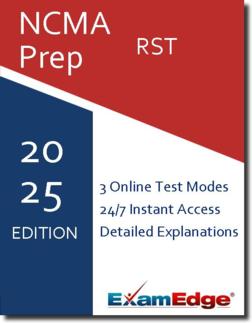NCMA RST (RST) Practice Tests & Test Prep by Exam Edge - FAQ
Based on 32 Reviews
- Real Exam Simulation: Timed questions and matching content build comfort for your NCMA RST test day.
- Instant, 24/7 Access: Web-based NCMA Registered Surgical Tech practice exams with no software needed.
- Clear Explanations: Step-by-step answers and explanations for your NCMA exam to strengthen understanding.
- Boosted Confidence: Reduces anxiety and improves test-taking skills to ace your NCMA Registered Surgical Tech (RST).

Why should I use Exam Edge to prepare for the NCMA Registered Surgical Tech Exam?
FAQ's for Exam Edge NCMA Registered Surgical Tech practice tests
- Comprehensive content: Exam Edge's NCMA Registered Surgical Tech practice tests are created specifically to prepare you for the real exam. All our NCMA RST practice test questions parallel the topics covered on the real test. The topics themselves are covered in the same proportions as the real test too, based on outlines provided by the National Certified Medical Assistant in their NCMA RST test guidelines.
- Realistic practice: Our NCMA RST practice exams are designed to help familiarize you with the real test. With the same time limits as the real exam, Our NCMA practice tests enable you to practice your pacing and time management ahead of test day.
- Detailed explanations: As you complete your practice tests, we show you which questions you answered correctly and which ones you answered incorrectly, in addition to providing you with detailed step-by-step explanations for every single NCMA Registered Surgical Tech practice exam question.
- Performance insights: After you complete a practice test, we provide you with your raw score (how many you answered correctly) and our estimate of the NCMA RST score you would have received if you had taken the real test.
- Ease of access: Because all Our NCMA practice tests are web-based, there is no software to install. You can take NCMA RST practice exams on any device with access to the internet, at any time.
- Flexible use: If you must pause while taking one of Our NCMA practice exam, you can continue right where you left off. When you continue the test, you will start exactly where you were, and with the same amount of time you had remaining.
- Thousands of unique questions: We offer 25 different online practice exams with 2,500 unique questions to help you prepare for your NCMA Registered Surgical Tech !
- Low cost: The cost of ordering 5 practice tests is less than the cost of taking the real NCMA RST test. In other words, it would be less expensive to order 5 practice tests than to retake the real NCMA Registered Surgical Tech exam!
- Our trusted reputation: As a fully accredited member of the Better Business Bureau, we uphold the highest level of business standards. You can rest assured that we maintain all of the BBB Standards for Trust.
- Additional support: If you need additional help, we offer specialized tutoring. Our tutors are trained to help prepare you for success on the NCMA Registered Surgical Tech exam.
What score do I need to pass the NCMA RST Exam?
To pass the NCMA Registered Surgical Tech test you need a score of 73.
The range of possible scores is 0 to 100.
How do I know the practice tests are reflective of the actual NCMA Registered Surgical Tech ?
At Exam Edge, we are proud to invest time and effort to make sure that Our NCMA practice tests are as realistic as possible. Our practice tests help you prepare by replicating key qualities of the real test, including:
- The topics covered
- The level of difficulty
- The maximum time-limit
- The look and feel of navigating the exam
Do you offer practice tests for other National Certified Medical Assistant subjects?
Yes! We offer practice tests for 6 different exam subjects, and there are 90 unique exams utilizing 9000 practice exam questions. Every subject has a free sample practice test you can try too!
NCMA RVAS (RVAS)
Practice Tests
NCMA Registered Billing & Coding Specialist (RBCS)
Practice Tests
NCMA RCMAS (RCMAS)
Practice Tests
NCMA Registered Pediatric Phlebotomy Specialist (RPPS)
Practice Tests
NCMA Registered Phlebotomy Specialist (RPS)
Practice Tests
NCMA Registered Surgical Tech (RST)
Practice Tests
To order tests, or take a sample test, for a different subject:
Click on ' Name on the Exam Name' You will be take to the orders page
How do I register for the real National Certified Medical Assistant ?
For up-to-date information about registration for the National Certified Medical Assistant , refer to the National Certified Medical Assistant website.


